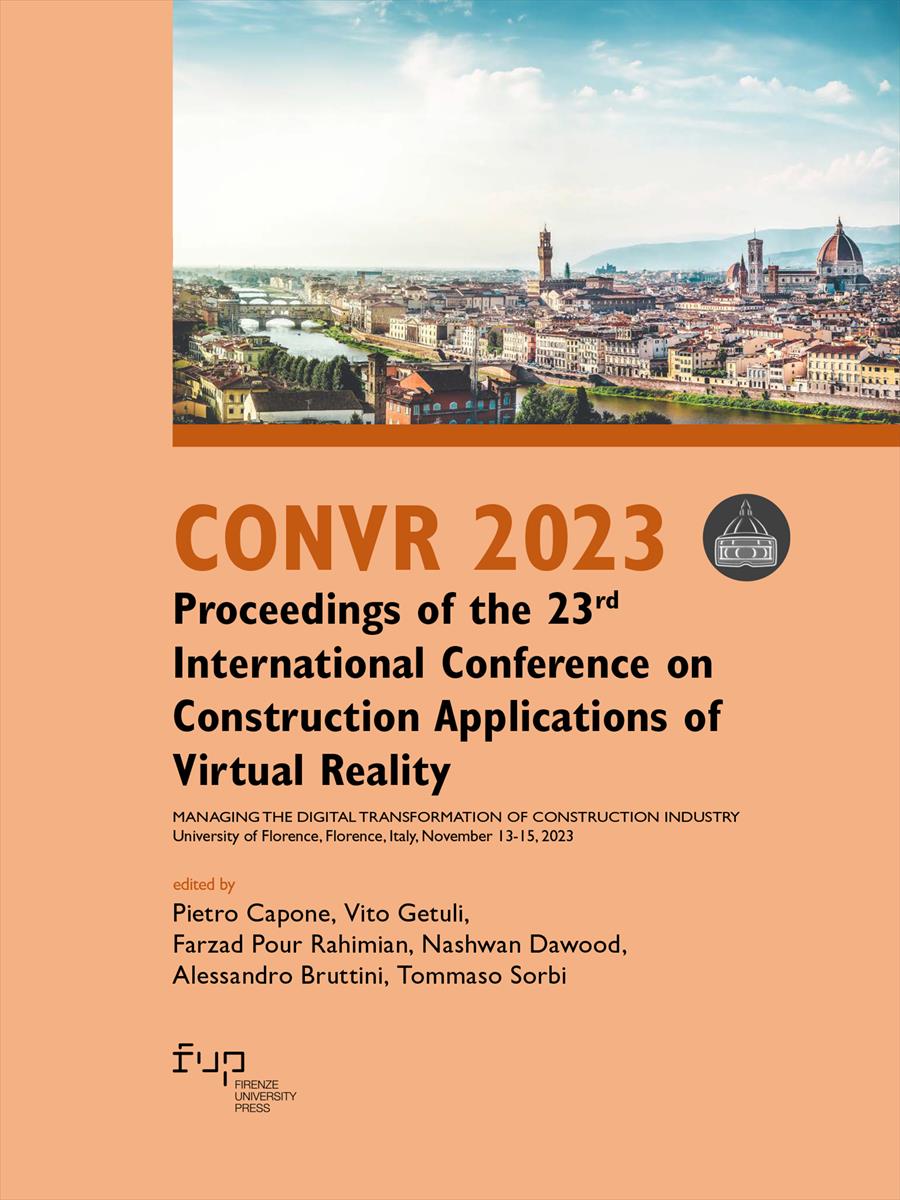- CONVR 2023 - Proceedings of the 23rd International Conference on Construction Applications of Virtual Reality
- Edited by Pietro Capone, Vito Getuli, Farzad Pour Rahimian, Nashwan Dawood, Alessandro Bruttini, Tommaso Sorbi
Transforming Building Industry Knowledge Management: A Study on the Role of Large Language Models in Fire Safety Planning
- Ori Ashkenazi
- Shabtai Isaac
- Alberto Giretti
- Alessandro Carbonari
- Dilan Durmus
- © 2023 Author(s) |
- CC BY-NC 4.0
- DOI: 10.36253/979-12-215-0289-3.73
This paper discusses the potential use of AI in general, and large language models (LLMs) in particular, to support knowledge management (KM) in the building industry. The application of conventional methods and tools for KM in the building industry is currently limited due to the large variability of buildings, and the industry’s fragmentation. Instead, relatively labor-intensive methods need to be employed to curate the knowledge gained in previous projects and make it accessible for use in future projects. The recent development of LLMs has the potential to develop new approaches to KM in the building industry. These may include querying a variety of relatively unstructured documents from previous projects and other textual sources of technical expertise, processing these data to create knowledge, identifying patterns, and storing knowledge for future use. A proposed framework is defined for the use of LLMs for KM in construction. We will perform preliminary analyses on how to train models that can generate information and knowledge required to make decisions in the development of specific tasks of fire safety planning
- Keywords:
- Large Language Models (LLMs),
- Knowledge Management (KM),
- Fire Safety Planning,
- Expert Systems (ESs),
- Artificial Intelligence (AI),
- Knowledge Graph,
- Ontology,
Ben-Gurion University of the Negev, Israel
Ben-Gurion University of the Negev, Israel - ORCID: 0000-0001-8601-7601
Università Politecnica delle Marche, Italy - ORCID: 0000-0001-7208-0845
Università Politecnica delle Marche, Italy - ORCID: 0000-0002-0721-631X
Università Politecnica delle Marche, Italy - ORCID: 0009-0007-9831-8875
- Duval, R.F., 2006. NFPA Case Study: nightclub fires. National Fire Protection Association, Fire Investigations Department.
- Fekri-Ershad, S., Tajalizadeh, H., & Jafari, S. (2013). Design and Development of an Expert System to Help Head of University Departments. arXiv preprint arXiv:1308.0356.
- Goldstein, I., & Papert, S. (1977). Artificial intelligence, language, and the study of knowledge. Cognitive science, 1(1), 84-123.
- Kodur, V., Kumar, P., & Rafi, M. M. (2019). Fire hazard in buildings: Review, assessment and strategies for improving fire safety. PSU Research Review, 4(1), 1–23. DOI: 10.1108/PRR-12-2018-0033
- Law, A., & Spinardi, G. (2021). Performing Expertise in Building Regulation: ‘Codespeak’ and Fire Safety Experts. Minerva, 59(4), 515–538. DOI: 10.1007/s11024-021-09446-5
- Liu, L. Y. (1995). Digital data-collection device for construction site documentation: Proceedings of the 2nd Congress on Computing in Civil Engineering. Part 1 (of 2). Computing in Civil Engineering (New York), 2, 1287–1293.
- Maiellaro, N. (1997). Using expert systems to check building applications. 19.
- Nikolic, B., & Dakic, J. (2015). Knowledge management in the function of risk assessment. 3(2).
- National Fire Protection Association (Ed.). (2017). NFPA 101: Life safety code 2018 (2018 edition). National Fire Protection Association.
- OpenAI. (2023). Fine-tuning Retrieved 2nd of May 2023 from https://platform.openai.com/docs/guides/fine-tuning/fine-tuning
- Parsamehr, M., Perera, U. S., Dodanwala, T. C., Perera, P., & Ruparathna, R. (2023). A review of construction management challenges and BIM-based solutions: Perspectives from the schedule, cost, quality, and safety management. Asian Journal of Civil Engineering, 24(1), 353–389. DOI: 10.1007/s42107-022-00501-4
- Saka, A., Taiwo, R., Saka, N., Salami, B., Ajayi, S., Akande, K., & Kazemi, H. (2023). GPT Models in Construction Industry: Opportunities, Limitations, and a Use Case Validation. arXiv preprint arXiv:2305.18997.
- Shanahan, M. (2023). Talking About Large Language Models (arXiv:2212.03551). arXiv. DOI: 10.48550/arXiv.2212.03551
- Stefik, M. (2014). Introduction to knowledge systems. Elsevier.
- Tofiło, P., Konecki, M., Gałaj, J., Jaskółowski, W., Tuśnio, N., & Cisek, M. (2013). Expert System for Building Fire Safety Analysis and Risk Assessment. Procedia Engineering, 57, 1156–1165. DOI: 10.1016/j.proeng.2013.04.146
- Wei, J., Wang, X., Schuurmans, D., Bosma, M., Xia, F., Chi, E., ... & Zhou, D. (2022). Chain-of-thought prompting elicits reasoning in large language models. Advances in Neural Information Processing Systems, 35, 24824-24837.
Chapter Information
Chapter Title
Transforming Building Industry Knowledge Management: A Study on the Role of Large Language Models in Fire Safety Planning
Authors
Ori Ashkenazi, Shabtai Isaac, Alberto Giretti, Alessandro Carbonari, Dilan Durmus
DOI
10.36253/979-12-215-0289-3.73
Peer Reviewed
Publication Year
2023
Copyright Information
© 2023 Author(s)
Content License
Metadata License
Bibliographic Information
Book Title
CONVR 2023 - Proceedings of the 23rd International Conference on Construction Applications of Virtual Reality
Book Subtitle
Managing the Digital Transformation of Construction Industry
Editors
Pietro Capone, Vito Getuli, Farzad Pour Rahimian, Nashwan Dawood, Alessandro Bruttini, Tommaso Sorbi
Peer Reviewed
Publication Year
2023
Copyright Information
© 2023 Author(s)
Content License
Metadata License
Publisher Name
Firenze University Press
DOI
10.36253/979-12-215-0289-3
eISBN (pdf)
979-12-215-0289-3
eISBN (xml)
979-12-215-0257-2
Series Title
Proceedings e report
Series ISSN
2704-601X
Series E-ISSN
2704-5846
